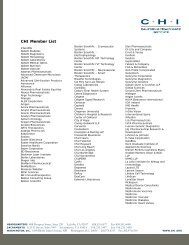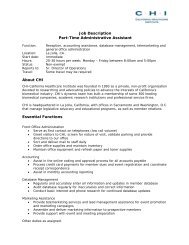California Biomedical Industry - California Healthcare Institute
California Biomedical Industry - California Healthcare Institute
California Biomedical Industry - California Healthcare Institute
You also want an ePaper? Increase the reach of your titles
YUMPU automatically turns print PDFs into web optimized ePapers that Google loves.
Product development<strong>California</strong>’s biopharmaceuticalpipeline leads the worldThe global biopharmaceuticalindustry had another strong year in2009, despite the economic crisis.Global demand for biotechnology andpharmaceutical products reached $752billion in 2009, reflecting growth of6.7 percent over the prior year. Of thistotal, biologic products contributedabout $127 billion, with faster growththan the overall market with 8.6 percentover the prior year. <strong>California</strong> is a keydriver of this success with seven of thetop 10 global biologic products from<strong>California</strong> companies. Biologics caninclude products such as vaccines, bloodand blood components, gene therapy,tissues, monoclonal antibodies andrecombinant therapeutic proteins.Figure 37: <strong>California</strong> companiesare researching and developing876 pipeline products<strong>California</strong> companies are researching and developing 876 products20317517 444433Michael KleinrockMichael Kleinrock is director, ThoughtLeadership at IMS, responsible forleading a team of analysts coveringU.S. and global issues and trends inthe pharmaceutical market. He joinedIMS in 1999 and served in a variety ofroles supporting key pharmaceuticalclients as well as developing productsand services. Since joining IMS’thought leadership team in 2006, hehas taken on increasing responsibilityfor U.S. market analytics, oncology,R&D pipeline analysis and marketforecasts. Named to his current rolein November 2009, he was previouslysenior manager, Thought Leadership.Kleinrock received a master’s degreein journalism from the Universityof London, Goldsmiths College in1996. He also earned a bachelor’sdegree in history and politics fromthe University of Essex, Colchester,England, in 1994.24 | <strong>California</strong> <strong>Biomedical</strong> <strong>Industry</strong> 2011 ReportDespite massive disruptions in otherindustries, the biopharmaceuticalindustry was largely resilient, reflectingstrong demand for its products andreflecting the impact of economicinstability in only limited ways. Thisresilience is fundamentally linked tothe value of innovation in healthcare,which for a generation has deliveredsignificant advances in a wide range ofdiseases. <strong>California</strong> is at the forefrontof this successful and dynamic industrywith the largest clustering of companiesand clinical development productsof any state in the U.S. and largerthan any other single country in theworld. In fact, at the end of August2010 there were some 876 productsin the <strong>California</strong> biopharmaceuticalpipeline, including those in pre-clinicaland clinical development throughregistration. The pipeline includesproducts that <strong>California</strong> companiesoriginated, or remain actively involvedin. The <strong>California</strong> biopharmaceuticalpipeline represents about 12 percent ofthe total worldwide biopharmaceuticalpipeline of 6,889 products as tracked byIMS Health R&D focus and reflectingbiopharmaceutical products in activedevelopment anywhere in the world.Since January 1, 2009, several newproducts with connections to <strong>California</strong>were approved and launched in the U.S.:PreclinicalPhase IPhase IIPhase IIIPre-registrationRegisteredSource: IMS Health, R&D Focus , Sep 2010••Denosumab is approved under thename Prolia for use by older womenwith osteoporosis and as Xgeva fordelaying bone fractures in cancerpatients. It will remain Amgen’slargest program for now, while thecompany begins late-stage testing onthree experimental cancer drugs.• • Kristexxa (pegloticase) approvedin September 2010 from Savientwas developed for the treatment ofchronic gout in adults refractory toconventional therapy, and grantedorphan drug status by the FDAback in 2001. Pegloticase wasdeveloped by Duke University andPEGylated versions of this proteinwere produced in collaboration withthe Menlo Park <strong>California</strong> company,Mountain View Pharmaceuticals, toincrease safety and prolong the halflifeof the protein. Gout is a kind ofarthritis in which unmetabolized uricacid forms crystals that migrate tojoints, causing painful inflammation.Kristexxa is a PEGylated formof recombinant porcine uricase,Uricase is an enzyme that isnot produced in humans, but isproduced by other mammals forthe breakdown of uric acid. Savientexpects Kristexxa to be commerciallyavailable by end of 2010.






